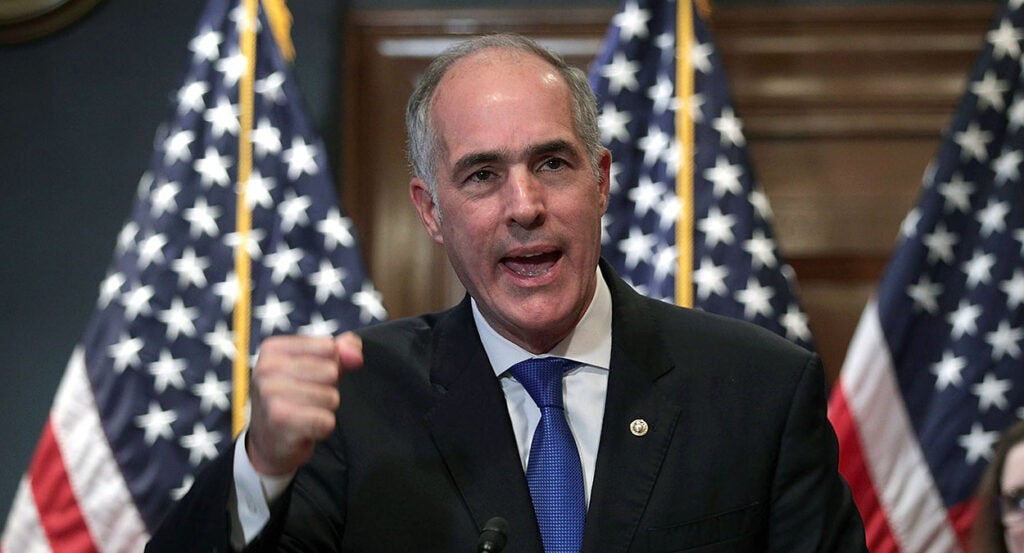So much for the Left’s trope that election fraud is a myth. Enter the chairwoman of the Bucks County Board of Commissioners, Diane Ellis-Marseglia, a Democrat, who openly advocated for Pennsylvania election officials to violate the law by counting illegal ballots in the U.S. Senate contest between challenger Dave McCormick and the incumbent Bob Casey, although every major media outlet has declared McCormick to be the winner.
Pennsylvania election officials should not take legal advice from Ellis-Marseglia, who is a social worker by education and training, as they are violating state and potentially federal law. And yet Philadelphia and two other counties, Centre and Montgomery, are apparently following her down the road to perdition.
The U.S. Senate’s Role
And what did Ellis-Marseglia actually say? “I think we all know that precedent by a court doesn’t matter anymore in this country… People violate laws anytime they want. So, for me, if I violate this law, it’s because I want a court to pay attention.”
Her “precedent doesn’t matter anymore” is likely an allusion to (and a statement of her disapproval of) the Supreme Court’s 2022 opinion in Dobbs v. Jackson Women’s Health Organization, which overturned the abortion precedent Roe v. Wade (1973). Courts will, no doubt, “pay attention” to her defiance of the law, but not for the reason she had hoped.
Even the left-leaning Washington Post editorialized that Democrats like Ellis-Marseglia are “thumb[ing] their nose at the rule of law.” The Post added that “elections need rules, established in advance of the voting, and those rules must be applied equally and consistently.” This defiance of the law and our legal system is “corrosive to democracy.”
The Post is correct.
The U.S. Senate should use its power under the Constitution to prevent corrupt officials in Pennsylvania from stealing the Senate election, defying the law and our democratic process. No matter what happens in a dishonestly conducted recount in Pennsylvania, the Senate should not accept such behavior.
As Sen. Mike Lee (R-Utah) warned Bob Casey and his lawyers and reminded his colleagues, under Article 1, Section 5 of the Constitution, “Each House shall be the Judge of the Elections, Returns and Qualifications of its own Members.” In other words, it is the Senate that has the ultimate power to judge who won the Pennsylvania Senate race when it convenes on Jan. 3, 2025, not Commissioner Ellis-Marseglia and her fellow conspirators.
It is not as if the Senate hasn’t used this authority in the past. In 1975, for example, it had to deal with two different election contests. One involved a race in Oklahoma between former Sen. (and former governor) Henry L. Bellmon, a Republican, and challenger Rep. Edmond Edmondson, a Democrat, in which Bellmon defeated Edmondson by 3,835 votes. The second involved a race for an open seat in New Hampshire between Rep. Louis Wyman, a Republican, and Insurance Commissioner John Durkin that was decided by 355 votes.
The key point to note from both of these cases is that it is the Senate that has the final say on who won an election, and it can conduct a full investigation of everything that occurred, from the behavior of election officials to an examination of the ballots cast.
In fact, in the Wyman-Durkin contest, which involved multiple recounts and both state and federal court decisions, the Senate committee assigned to investigate the case had 3,500 disputed ballots transported from New Hampshire to Washington, D.C., where “they were kept under guard” so that each one could be individually reviewed and the Senate could decide whether they should be counted or not.
Prosecution by Local District Attorneys
Furthermore, election officials openly defying the ruling by the Pennsylvania Supreme Court that provisional ballots must be signed in two places and that mail-in votes must be signed and dated could be prosecuted by local district attorneys for violating state criminal law.
Under Pennsylvania law, election officers commit felony fraud, punishable by up to seven years in prison and a $15,000 fine, if they “certify as correct a return of ballots in the ballot box which he knows to be fraudulent,” or if they “make any false entries in the district register,” or if they register “fraudulent votes upon any voting machine or of aiding in the perpetration of any such fraud,” or if they engage in a dozen other activities meant to count fraudulent votes. On top of that, the statute makes it a crime for anyone “who shall conspire with others to commit any of the offenses herein mentioned, or in any manner to prevent a free and fair primary or election.”
The Pennsylvania District Attorneys Association, in collaboration with the state’s Office of Attorney General, published a guidance document for all elected district attorneys outlining the jurisdiction and criminal laws applicable to offenses arising under the state election code. There are dozens of state criminal statutes that cover the waterfront of election-related activities, many of which could possibly apply to election officials openly defying the Pennsylvania Supreme Court and intentionally and knowingly violating state law.
So, despite the ignorant comments from Ellis-Marseglia encouraging others to violate the law, election officers who are, or are considering, following her outrageous advice may want to think twice.
There are 67 counties in Pennsylvania, each of which has an elected district attorney. Any election official in a county who is taking legal advice from a social worker and is violating the criminal law of the state by thumbing her nose at the state Supreme Court and applicable state law could be prosecuted by the local district attorney and, if convicted, spend time in prison.
Regardless, even if Pennsylvania law enforcement officials refuse to act, the U.S. Senate cannot allow such obstruction of our democratic process to stand, and it has the constitutional authority to stop it.
